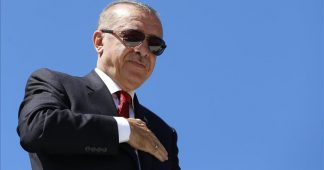Israel’s defense industry has increased its profits in recent years, selling weapons to European countries supporting Ukraine in its war against Russia
June 5, 2025
Israel’s defense industry reached a new milestone in 2024, with annual arms exports surging to a record $14.8 billion, marking the fourth consecutive year of growth, even as calls for boycotts over the war in Gaza intensified across Europe.
According to figures released on 5 June by Israel’s Defense Ministry, arms exports rose 13 percent compared to 2023, driven largely by European countries increasing defense budgets in response to Russia’s war in Ukraine. Defense exports now account for nearly 10 percent of all Israeli exports and nearly a quarter of goods exports.
Despite growing political opposition to Israeli military actions in Gaza, 54 percent of all Israeli defense exports in 2024 were sold to European countries, up sharply from 35 percent the previous year. Sales to Europe totaled $8 billion, nearly doubling from 2023, as European governments rushed to bolster air defense and missile systems amid concerns about a future war with Russia.
Israeli Defense Minister Israel Katz praised the export boom as “a direct result of the successes of the IDF and the defense industries against Hamas in Gaza, Hezbollah in Lebanon, the Houthis [Ansarallah] in Yemen, the Ayatollah regime in Iran, and in other arenas.”
“The world sees Israeli strength and seeks to be a partner to it,” he claimed.
Israeli forces have killed over 55,000 Palestinians as part of their genocide in Gaza, of which at least 80 percent are civilians. The Economist recently estimated the death toll at nearly 110,000 from direct violence alone. Many Palestinians in Gaza are also dying from the effects of Israel’s blockade of the strip and the destruction of hospitals and other infrastructure.
The Defense Ministry said that air defense systems, missiles, and rockets made up nearly half (48 percent) of total exports.
These sectors have gained prominence due to Israel’s combat performance and their perceived deterrent value in an era of drone warfare and missile threats. Systems like Iron Dome, David’s Sling, and Arrow have drawn particular interest due to their defensive orientation, which elicits less political opposition compared to offensive weapons.
Israeli weapons sales also rose in the Asia-Pacific region and among Abraham Accords countries. Notably, Israeli defense exports to the UAE, Bahrain, and Morocco rose from three percent to 12 percent of the total.
Still, political pressure on Israeli defense deals is mounting. On Tuesday, Spain canceled a $325 million contract with Rafael Advanced Defense Systems for anti-tank missiles, citing concerns over Israeli atrocities in Gaza.
France, in particular, is considering “concrete steps” against Israel over what President Emmanuel Macron sees as Tel Aviv’s obstruction of humanitarian aid to Gaza. Speaking in Paris on Thursday, Macron said a decision would be made “in the next couple of days.” Alongside him, Brazilian President Luiz Inacio Lula da Silva renewed calls for Palestinian statehood recognition, adding diplomatic pressure.
Israeli officials remain concerned that future deals, especially with western Europe, may face legislative hurdles or be delayed. Nonetheless, officials expect demand to remain strong, especially as Europe boosts military budgets and reconfigures its defense posture in light of US President Donald Trump’s demands that NATO countries increase defense spending to five percent of GDP.
We remind our readers that publication of articles on our site does not mean that we agree with what is written. Our policy is to publish anything which we consider of interest, so as to assist our readers in forming their opinions. Sometimes we even publish articles with which we totally disagree, since we believe it is important for our readers to be informed on as wide a spectrum of views as possible.











